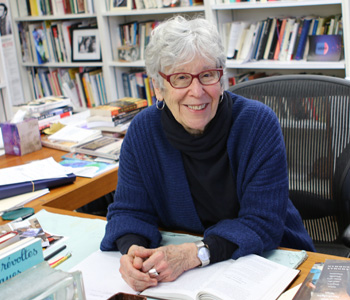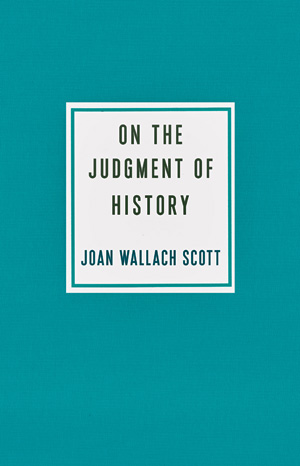
We hear a lot these days about the judgment of history. In the face of political conflict, corruption, and sheer lies, we sometimes comfort ourselves by saying that “history” will right the moral and factual wrongs of the present. At some future time, the record will be set straight, evil condemned, and “legacies” established for posterity. This is a vision of history (a fantasy, I argue) that imagines a story of inevitable progress; that expects we can count on the future to be an improvement over the past. It is the vision expressed by Martin Luther King Jr., citing the abolitionist Theodore Parker: “the arc of the moral universe is long, but it bends towards justice.” My book is an extended reflection on this idea, rejecting its Enlightenment optimism and suggesting a different vision entirely. It’s not judgment we should look to in history, but a record of processes of contention and conflict, a story of successful and unsuccessful struggles against and for power that may serve present actors as caution or inspiration.
An additional focus is on the idea—dating from the Enlightenment as well—that the state is the highest instrument of historical progress, the institution best placed to deliver the justice that constitutes the judgment of history. I suggest that we should be skeptical of the state’s ability to do that since it is above all a political institution, an arena of necessary conflict, a place where balances of power are always in play. We should look neither to a reified idea of history nor of the state, but to human actors in their diverse and complicated movements to appreciate what counts as history.
The book examines three cases: the Military Tribunal at Nuremberg in 1945-6, at the end of the Second World War; the Truth and Reconciliation Commission (TRC) in South Africa at the end of the apartheid regime in 1996; and the ongoing movements in the United States for reparations for slavery. In the first two cases, there is a clear idea that the judgment of history is being enacted. At Nuremberg, the Nazis were defeated in war and the victorious powers hoped they would forever put to rest the crimes against humanity committed by Hitler’s National Socialist Regime. The TRC sought to expose the crimes of apartheid (to render a judgment about the atrocities committed) without, however, being able to indict or punish those responsible. There had been no victory in war, but rather a negotiated settlement to end apartheid and usher in black political majority rule.
At Nuremberg, while the Nazis were condemned for “crimes against humanity”, the more mundane racist aspects of their nationalism, the belief in the homogeneity of the national body, were left in place, thus protecting the domestic treatment of minorities in the victorious powers. That, in turn, left open the return of the repressed—an ethno-nationalism expressed as racist violence within nation-states and in their colonies. In South Africa, what began as an examination of the structures of power of the apartheid regime became a Christian narrative of individual forgiveness, enabling racist economic inequality to persist into the new post-apartheid state. Political equality there did not mean economic or social equality for the African majority. There was only a partial “judgment” of what had constituted the inequalities of the past and so some of those persisted into the present.
The chapter on movements for reparations for slavery in the US presents a different story, one in which those movements call for a revised history of state actions to end slavery and then racial discrimination. The state actions always fall short of their promise, leading reparations movement activists to call for a critical revisionist history that recognizes that things like the Emancipation Proclamation of 1863, or Brown v. Board of Education in 1954, for all the progress they accomplished, did not end the structural racism that characterizes the United States to this day. For these movements, more a demand for accounting than a judgment of history, the moral as well as political reckoning of the legacy of slavery is yet to come.
I came to do this book in the wake of the Charlottesville riots in 2017, when I found myself asking “what ever happened to the judgment of history”? Weren’t Nazis and Ku Klux Klansmen consigned to the past by a consensus of democratic peoples in the United States and elsewhere? I knew, as a historian, that this was a naïve question, but I was struck by my knee-jerk response. My work in history has been about modern France and about gender and women’s history, informed by feminist theory. So it did not seem a stretch to ask what it meant to think of history as able to make definitive moral as well as factual judgments. When I was invited to do three lectures at Columbia University in 2019, there was a good opportunity to explore the question. The book is a revision and expansion of those lectures.
If a reader happened upon the book in a bookstore, I’d hope they would read the first pages of the introduction, which explains why I came to do the book; and then perhaps the chapter on the reparations movement, which speaks to our present in critical and, I like to think, insightful ways. In that chapter I focus on the writing on the subject of reparations by the journalist Ta-Nehisi Coates. He makes the case for reparations less as specific financial repayment of a debt long owed, and rather as something he calls “a national reckoning that would lead to spiritual renewal (…). Reparations would mean a revolution of the American consciousness, a reconciling of our self-image as the great democratizer with the facts of our history.” Here history is a critical rewriting of the past; a form of accounting for past wrongs. The anthropologist David Scott calls for a “moral and reparatory history”, by which he means what Coates does: a history that recognizes as untenable, the progressive narrative of American democracy, replacing it with a more complicated, uneven story in which time and place have multiple valences.
Reading that third chapter illustrates my own preoccupation, developed more fully in the epilogue, about what it means to write “critical history”. That history asks us to examine the categories of analysis we use to think about the past, to ask what interpretive and political ends they might serve, and to explore how present concerns influence what we make of past events. Where does the idea come from that history should constitute a coherent, linear narrative, a singular story of national development? What are the other ways of writing that history, for example as a story of proposals and plans offered but rejected that political units consist of small communal associations instead of large, centralized nation-states? What kinds of argument were made on either side? How did one view prevail over the other and, in the process, erase the losing position from visibility for the future? Maybe we should add the epilogue to the list of readings for a browser to at least glance at. The introduction and epilogue provide a theoretical frame for the three substantive historical chapters.
I hope readers will find it interesting to think about the much-repeated references to the judgment of history, where they come from, what they imply. The book is a critical exploration of why and how we use that idea, what its history is (it’s an eighteenth-century secular version of the idea of God’s judgment at the End of Times), what its limits are for understanding the work not only of historians (we make very different judgments depending on our perspectives and the questions we ask) but also of history itself—that body of material that recounts the lived lives and the contests and conflicts with and about power in which human actors engage.
I think it’s important for non-specialists, non-historians to think with me about what history does and doesn’t do for our understanding of the past and the present. History is never only a true story about the past. That’s not to say it’s fiction or “alternative facts”, but that it presents real facts in the service of an interpretation. The interpretation may be a moral judgment, but it is never THE judgment; it may be a political judgment, explicitly or implicitly taking sides with the people whose lives and actions are being recounted. It may rest on imaginative reconstructions of pasts in the absence of complete archives, as in some very compelling studies, especially of slavery and black lives in subsequent periods. It may seek to call into question current common-sense beliefs in the relationships of past and present, stories told, for example, of the unrelenting progress of racial or gender relations in the United States and elsewhere.
Right now, we are witnessing an extraordinary attack on this kind of history in France, where the Minister of Education and the President are calling critical histories of race and colonialism a subversion of the unity of the nation. These politicians are threatening to close down programs devoted to these histories on the grounds not only that they are subversive, but that they are not objective science and instead said to be political ideology. In fact, these programs of critical studies of race are often based on hard data that confirm real inequalities of access to jobs, education, housing, and the like. It is the government representatives who are driven by political motives, in this case sheer calculation about what will win popular support away from the far-Right party in the upcoming presidential election.
All of this is to say that history is not only an account of past contests for recognition and power, but also that the writing of history is itself an engagement with those very contests in the present.


Joan W. Scott is Professor Emerita in the School of Social Science at the Institute for Advanced Study in Princeton, New Jersey. She previously taught at Brown University, where she was the founding director of the Pembroke Center for Teaching and Research on Women. Her books include her classic, Gender and the Politics of History (1988, 2018), and, more recently, The Politics of The Veil (2007); Sex and Secularism (2019); and Knowledge, Power, and Academic Freedom (2019).